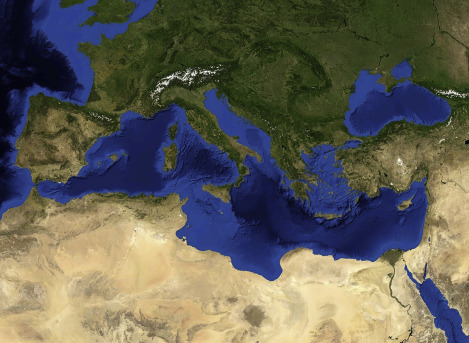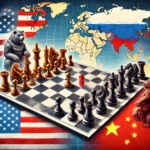Summary by Geopolist | Istanbul Center for Geopolitics
Mediterranean Transitions from the Gulf to the Sahel: The Role of Italy and the EU, edited by Giulia Daga and Pier Paolo Raimondi, represents an ambitious approach to geopolitical and energy dynamics in a wide region reaching from the Mediterranean to the Gulf and the Sahel. It speaks of how the latest conflicts, energy crises, and disputes of the great powers have made the EU’s Southern Neighborhood increasingly crucial for both Italian and European interests. In fact, Italy and the EU have been taking strong measures to move energy supply away from Russia and reshaping political alliances in order to focus on emerging regional and global scenarios.
Geopolitical Context
Strategic importance: The Mediterranean, Gulf, and Sahel regions have gained strategic importance due to several factors, including conflicts (e.g., the war on Gaza and the war in Ukraine), energy supply challenges, and the reshaping of international partnerships. The urgency to diversify energy sources has led to renewed efforts by Italy and the EU to establish new energy partnerships and strengthen existing ones with countries in these regions.
Energy Crisis: The war in Ukraine, followed by the energy crisis, made Europe revise its dependencies. The invasion of Ukraine by Russia had set a milestone that pushed Europe to seek new partnerships over and above its traditional suppliers in the Mediterranean and sub-Saharan Africa.
The research consists of six chapters, each discussing one particular aspect of the geopolitical and energy transitions in the Mediterranean, Gulf, and Sahel regions:
Chapter 1: EU-African Energy and Climate Cooperation:
The current and future potential cooperation between the EU and African countries on energy and climate is discussed. It also emphasizes that any future partnership in energy should be more integrated, with investments in local development for a sustainable and just transition.
This chapter develops a better understanding of the current status of energy trade between the EU and Africa, with a particular emphasis on the gas sector. Furthermore, it discusses potential cooperation on CRMs and hydrogen in the future, underlining that for such a partnership to succeed, African needs related to energy must be taken into consideration.
Chapter 2: Regional Energy Cooperation in the Gulf:
This chapter looks at Europe’s role in regional energy cooperation in the Gulf. It discusses how these countries of the Gulf region, namely, Bahrain, Iran, Iraq, Kuwait, Oman, Qatar, Saudi Arabia, and the UAE, will face challenges as the global environment adjusts to a world with less dependence on fossil fuels.
The chapter underlines the strategic role of the Gulf in the global energy market, including its possible future contribution to renewable energy production. Additionally, it considers how Europe might assume a role in creating cooperation with these states to ensure a stable and diversified energy supply.
Chapter 3: Political and Security Dynamics in the Sahel and Mediterranean:
This chapter addresses the complex Sahel political and security landscape and its links with the Mediterranean region. It deals with how Italy’s role has evolved to steer geopolitical intricacies in these regions, especially in response to the humanitarian-development-security nexus. The chapter argues that regional fragility, insecurity, and geopolitical competition – including, among others, the role of Russia – show what this means for European policy.
Chapter 4: Diplomatic Shifts in the Gulf
This chapter takes up the conflicts in the Gulf through their political dynamics, with especial emphasis on the war on Gaza and the Yemen war. It discusses the interconnected crisis in the Red Sea and a wider sense of polarization across the region.
The recent diplomatic efforts that de-escalate the tensions and create cooperation at a regional scale such as Abraham Accords and the historic deal between Saudi Arabia and Iran are discussed in the chapter. The chapter also evaluates the part played by Europe in ensuring diplomatic engagements in the Gulf to foster stability and cooperation.
Chapter 5: The Role of Global Powers:
This chapter brings into light the involvement of China, Russia, and the United States in the regions of the Mediterranean, the Gulf, and the Sahel. How these actors navigate the geopolitical transitions in respective areas is considered.
This chapter provides an overview of how growing interconnectedness and competition among global powers shape the geopolitical environment of the region, besides its consequences for European and Italian strategic interests.
Chapter 6: Integrated Strategies for Italy and the EU
This concluding chapter integrates the insight of the previous chapters with regard to the search for strategies that serve both Italy’s and the EU’s strategic goals without the concrete adverse consequences of governance and development on their partners.
It emphasizes a holistic approach toward energy and political cooperation that will balance energy security, economic growth, and sustainable development in the regions of interest.
Key Themes and Strategies Energy Diversification: One of the main themes expressed throughout this research is energy diversification, necessary to reduce dependency on Russian energy. Italy and the EU are actively seeking new energy partnerships with countries within the Mediterranean and the Sahel. This relates to traditional fossil fuels, and renewable sources, but also to investments in CRMs and hydrogen production.
Italy’s Mattei Plan: The so-called “Mattei Plan” of Italy is directed to make the country, with an energy hub and a bridge between Europe and Africa, achieve such a position. It looks forward to forging very sound and clear win-win partnerships with African countries and definitely departs from a top-down donor-recipient paradigm. This is underlined by integrated cooperation across sectors-energy, health, infrastructure, agriculture, and education.
Political and security reconfigurations: The research debates the shifting alliances and geopolitical competition in the Mediterranean, Gulf, and Sahel. It looks at Italy’s role within the changing security landscape and regional fragility, with a particular focus on the Sahel, where a system of geopolitical competition with numerous military interventions makes the security environment particularly complex.
Global Power Competition: The growing engagement of global powers such as China, Russia, and the U.S. in the region makes it relevant for European and Italian foreign policy. Against this backdrop, this paper will try to assess how these global players influence regional dynamics, and the subsequent challenges and opportunities brought about for the EU’s strategic interests vis-à-vis the Middle East and North Africa region.
Holistic approach: The study advocates for an integrated approach in which energy, political and security challenges are pursued holistically. There is a call for coherent strategies with Italy’s strategic goals and those of the EU, carefully weighing options so that partnerships would not lead to negative governance and local development of the concerned regions.
Role of Italy and Strategy
Energy Hub and Bridge: Italy should position itself as a main energy hub in the Mediterranean and a bridge between Europe and Africa. This will involve strengthening partnerships with countries both in North Africa and sub-Saharan Africa to ensure a diversified energy supply.
The integrated approach that Italy has developed for the Mediterranean, the Gulf, and the Sahel ranges widely-from energy security to the political and security dynamics. Such a far-reaching integrated foreign policy stimulates stability, development, and cooperation, with a view to matching European strategic interests.
Regional Cooperation: The evolving role of Italy is irrevocably entangled with the complex regional dynamics ranging from the politics of the Gulf to the security challenges of Sahel. The emphasis of the strategy for the country has, therefore, fallen on regional cooperation and dialogue mechanisms for stability and dealing with transnational challenges.
Conclusion
The detailed examination of geopolitical and energy transitions in the Mediterranean, the Gulf, and the Sahel and their impacts on Italy and the EU. This points out the urgent need for diversification of energy supply for Italy and the EU, regional partnering, and how to maneuver through regional and global power competition. The book enriches the understanding of strategies and approaches that Italy and the EU may adopt toward the pursuit of its strategic objectives in pursuance of sustainable development and stability in its Southern Neighborhood.







